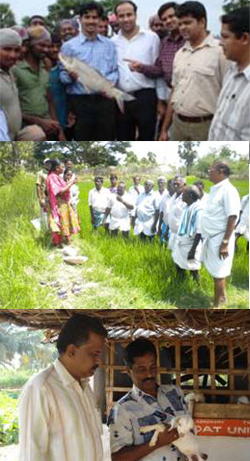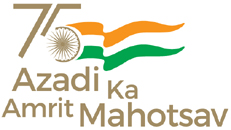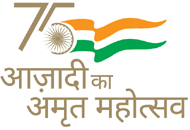About PGDAEM Course
The Mission
To Transform the Public Extension Functionaries into Professional Cadre of Farm Advisors
Course Objectives
-
To enhance the techno-managerial competence of extension functionaries
-
To acquaint the extension functionaries on the latest developments in the field of agricultural extension
-
To equip the extension functionaries in latest tools and techniques for participatory decision making
-
To develop an insight into various extension models to enrich the agri - value chain
For Whom
-
The Diploma is open for the extension functionaries graduated in agriculture and allied areas and currently employed in the state / central / UT’s Govts
-
A minimum five years of work experience in the field of agricultural extension. Relaxable in case of deserving cases.
-
Preferable age limit is up to 45 years. However, it is relaxable in exceptional cases.
-
Candidates working in Agri-Business Companies, NGOs, Cooperatives and other private sector are also eligible on self-financing basis.
Selection of Candidates
The candidates for admission in the Diploma course will be identified and selected by concerned ATMAs following the prescribed criteria. The application of selected candidates must be forwarded through the State Nodal Officer. The admission to the Diploma Programme is made once in a year.
Duration
The duration of the programme is of one-year, spread over in two Semesters with 30 credit loads, each credit load is equal to 30 work hours. In each Semester contact classes will be held at SAMETI / an identified institute.
Delivery Mechanism
The programme is conducted in distance mode and supported with print material, contact classes, e-learning (study material, question bank and pre-recorded video sessions online) and assignments. The candidates are required to complete one assignment in each course in a Semester and a project report at the end of second semester.
Programme Evaluation
The candidates will be evaluated based on the performance in the written examinations and assignments. The written examination is of 70 marks and assignment is of 30 marks for each course. A minimum of 50 marks is required to qualify in each course. The candidates who score 70% marks and above will be awarded first division. The candidates who score 80% marks and above will be awarded distinction. The candidates who failed to qualify will be allowed to re-appear for the examinations in the next year. The registration is valid for only two years.
Fee
A provision is made in the revised cafeteria of State Extension Work Plan (SEWP) to meet the expenses for the Post Graduate Diploma in Agricultural Extension Management (PGDAEM). This programme has been included in the State level innovative activity with a cost norm of Rs.15,000 per candidate and an annual ceiling of Rs.3.75 Lakh @ 25 candidates per ATMA district.
For NGOs and private sectors the fee will be Rs. 15000/- to be paid by the sponsoring agency in the form of Demand Draft in favour of "MANAGE" payable at Hyderabad.
Requirement for Award of Diploma
The candidates should attend all the contact classes as scheduled, submit the assignments, project report and complete all the academic formalities prescribed as communicated to the candidates from time to time.
Undertaking by the Candidate
The candidate who registers for the Diploma has to give an undertaking stating that he/she will complete the course within a period of two years failing which the entire course expenditure i.e., Rs.15000/- will be recovered from his/her salary. The undertaking has to be forwarded by the Sponsoring Agency to MANAGE along with the application form.
Medium of Instruction: English
Courses Offered
Semester-I
-
Course 101: Introduction to Agricultural Extension (3 credits)
-
Course 102: Facilitation for Development (2 Credits)
-
Course 103: Communication for Development (4 credits)
-
Course 104: Gender Mainstreaming for Agricultural Development (3 Credits)
-
Course 105: Leadership and Management Skills (3 Credits)
Semester-II
-
Course 201 : Rural Sociology (2 Credits)
-
Course 202 : Farm Business Management (4 Credits)
-
Course 203 : Planning for Agricultural Management (3 Credits)
-
Course 204 : Extension for Sustainable Agricultural Development (3 Credits)
-
Course 205 : Project work




